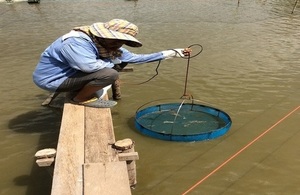£2M grant to reduce major aquaculture diseases
Cefas and the University of Exeter are leading on project to develop and apply new molecular biology techniques in aquaculture.

Shrimp farmer
Cefas and the University of Exeter are leading on a £1.97M BBSRC-Newton Fund project to develop and apply new molecular biology techniques to reduce the impact of major diseases in aquaculture for the improvement of the livelihood of small-scale farmers in India, Bangladesh and Malawi.
Aquaculture contributes significantly to global food security and poverty reduction. In Bangladesh and India the shrimp fishing industry sustains the livelihoods of hundreds of thousands of poor people. Fish farming too is fundamental to the lives of small scale farmers in India and in developing countries around the world. Disease is the biggest single factor limiting growth in aquaculture (with associated annual losses estimated at more than $6bn globally) and combating disease is critical for both the protection of the livelihoods of small scale farmers and for achieving national and global targets for aquaculture growth to help reduce poverty.
In this project environmental DNA (eDNA) methods will be applied to help understand the microbiome (assemblages of microbes and pathogens) in fish and shellfish culture ponds and within the organisms themselves for developing early warning of diseases and for avoiding disease outbreaks in low income countries where food is scarce. A central theme in this project is the alignment of the efforts of farmers, health professionals, researchers and national authorities to help prevent disease outbreaks.
Professor Charles Tyler, of the University of Exeter, who will lead the work, said:
“This grant provides a wonderful opportunity for us to combine our molecular skills in Biosciences at Exeter, with the expertise in disease diagnosis, pathology, and eDNA at Cefas, to better understand how the microbiology within culture ponds relates to health status and disease outbreaks in key crop species (shrimp and finfish) in India, Bangladesh and Malawi. We will use the data to develop models for predicting the drivers of disease outbreaks that can be applied to allow for measures to reduce or prevent crop losses for farmers.”
Cefas lead Dr David Bass said:
“Cefas are leaders in research and development seeking to safeguard global food security and thereby support vulnerable communities. As part of this project we aim to develop simple and accurate early-warning molecular-based tools for use by farmers enabling them to pre-empt and avoid the impacts of disease events’. He added: “In this project we will engage and train farmers in accurate disease diagnostics and establish communication and training networks that will disseminate the outputs of the project as widely as possible. In order to achieve this we will use cutting edge microscopy and molecular tools to understand the microbiome of aquaculture ponds and how this relates to disease outbreaks’.
This project is funded under the Global Research Partnership: BBSRC-Newton Fund Aquaculture Call. This project builds on a strategic alliance forged between the University of Exeter and Cefas, led by Professor Tyler and Dr Grant Stentiford (Cefas), to develop a strong research partnership and facilitate knowledge exchange and training between Exeter and Cefas.
Professor Tyler said:
”We established an agreement with Cefas five years ago which has jointly funded 10 PhDs studentships and I am delighted to say that we are now extending this agreement for a further five years, with a joint commitment of £800,000 to fund an additional 10 PhD studentships”.
Dr Stentiford said:
‘The new agreement will allow us to grow our expertise collectively to help make a difference particularly in areas such as disease diagnosis and prevention in aquaculture.”
About the Centre for Environment, Fisheries and Aquaculture Science (Cefas)
The Centre for Environment, Fisheries and Aquaculture Science (Cefas) is a world leader in marine science and technology, providing innovative solutions for the aquatic environment, biodiversity and food security. We are the UK’s most diverse centre for applied marine and freshwater science and research, covering an unrivalled breadth of specialist areas to provide a fully integrated, multi-disciplinary approach. Our customer base is diverse, including the UK government and UK Overseas Territories, international governments, public and private sector organisations. We are an Executive Agency of Defra.
For more information about Cefas visit www.cefas.co.uk and follow @CefasGovUK
About the University of Exeter
The University of Exeter is a Russell Group university that combines world-class research with very high levels of student satisfaction. Exeter has over 19,000 students and is one of the global top 100 universities according to the Times Higher Education World UniversityRankings 2015-16, positioned 93rd. Exeter is also ranked 7th in The Times and The Sunday Times Good University Guide 2016, 9th in the Guardian University Guide 2016 and 10th in The Complete University Guide 2016. In the 2014 Research Excellence Framework (REF), the University ranked 16th nationally, with 98% of its research rated as being of international quality. Exeter was named The Times and The Sunday Times Sports University of the Year 2015-16, in recognition of excellence in performance, education and research. Exeterwas The Sunday Times University of the Year 2012-13. The University has invested strategically to deliver more than £350 million worth of new facilities across its campuses in the last few years; including landmark new student services centres - the Forum in Exeter and The Exchange on the Penryn Campus in Cornwall, together with world-class new facilities for Biosciences, the Business School and the Environment and Sustainability Institute. There are plans for further investment between now and 2016.